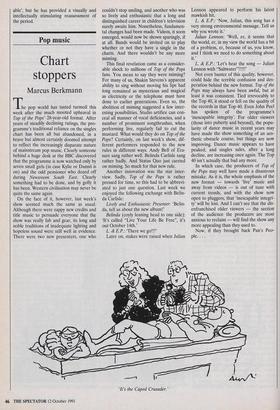Pop music
Chart stoppers
Marcus Berkmann
The pop world has tasted turmoil this week after the much mooted upheaval in Top of the Pops' 28-year-old format. After years of steadily declining ratings, the pro- gramme's traditional reliance on the singles chart has been all but abandoned, in a brave but almost certainly doomed attempt to reflect the increasingly disparate nature of mainstream pop music. Clearly someone behind a huge desk at the BBC discovered that the programme is now watched only by seven small girls (in case Kylie or Dannii is on) and the odd pensioner who dozed off during Newsroom South East. Clearly something had to be done, and by golly it has been. Western civilisation may never be quite the same again.
On the face of it, however, last week's show seemed much the same as usual. Although there were zappy new credits and title music to persuade everyone that the show was really fab and gear, its long and noble traditions of inadequate lighting and hopeless sound were still well in evidence. There were two new presenters, one who couldn't stop smiling, and another who was so lively and enthusiastic that a long and distinguished career in children's television surely awaits him. Nonetheless, fundamen- tal changes had been made. Videos, it soon emerged, would now be shown sparingly, if at all. Bands would be invited on to play whether or not they have a single in the charts. And there wouldn't be any more miming.
This final revelation came as a consider- able shock to millions of Top of the Pops fans. You mean to say they were miming? For many of us, Shakin Stevens's apparent ability to sing without moving his lips had long remained as mysterious and magical as electricity or the telephone must have done to earlier generations. Even so, the abolition of miming suggested a few inter- esting possibilities. Studio artifice can con- ceal all manner of vocal deficiencies, and a number of prominent songthrushes, when performing live, regularly fail to cut the mustard. What would they do on Top of the Pops? Certainly, on last week's show, dif- ferent performers responded to the new rules in different ways. Andy Bell of Era- sure sang rather well. Belinda Carlisle sang rather badly. And Status Quo just carried on miming. So much for that new rule.
Another innovation was the star inter- view. Sadly, Top of the Pops is rather pressed for time, so this had to be a,bbrevi- ated to just one question. Last week we enjoyed the following exchange with Belin- da Carlisle: Lively and Enthusiastic Presenter: 'Belin- da, tell us about the new album!'
Belinda (coyly leaning head to one side): `It's called "Live Your Life Be Free", it's out October 14th.'
L. & E.P.: 'There we go!!!'
Later on, stakes were raised when Julian Lennon appeared to perform his latest mawkish hit.
L. & E.P.: 'Now, Julian, this song has a very strong environmental message. Tell us why you wrote it.'
Julian Lennon: 'Well, er, it seems that the world, er, in my view the world has a bit of a problem, er, because of us, you know, and I think we need to do something about it.'
L. & E.P.: 'Let's hear the song — Julian Lennon with "Saltwater"11/ Not even banter of this quality, however, could hide the terrible confusion and des- peration behind the new format. Top of the Pops may always have been awful, but at least it was consistent. Tied irrevocably to the Top 40, it stood or fell on the quality of the records in that Top 40. Even John Peel has spoken of the programme's `inescapable integrity'. For older viewers (those into puberty and beyond), the popu- larity of dance music in recent years may have made the show something of an aes- thetic obstacle course, but things are now improving. Dance music appears to have peaked, and singles sales, after a long decline, are increasing once again. The Top 40 isn't actually that bad any more.
In which case, the producers of Top of the Pops may well have made a disastrous mistake. As it is, the whole emphasis of the new format — towards 'live' music and away from videos — is out of tune with current trends, and with the show now open to pluggers, that 'inescapable integri- ty' will be lost. And I can't see that the dis- enfranchised older viewers — the section of the audience the producers are most anxious to reclaim — will find the show any more appealing than they used to.
`It's the Caped Crusader.'


























































 Previous page
Previous page